BMW X7 VS Ford Puma – Specs, Efficiency & Price Comparison
Which model is the better choice – the BMW X7 or the Ford Puma? We compare performance (530 HP vs 168 HP), boot capacity (750 L vs 523 L), efficiency (7.90 L vs 13.10 kWh5.40 L), and of course, the price (90100 £ vs 24800 £).
Find out now which car fits your needs better!
The BMW X7 (SUV) is powered by a Diesel MHEV, Petrol MHEV or Petrol engine and comes with a Automatic transmission. In comparison, the Ford Puma (SUV) features a Petrol MHEV or Electric engine and a Manuel or Automatic gearbox.
When it comes to boot capacity, the BMW X7 offers 750 L, while the Ford Puma provides 523 L – depending on what matters most to you. If you’re looking for more power, you’ll need to decide whether the 530 HP of the BMW X7 or the 168 HP of the Ford Puma suits your needs better.
There are also differences in efficiency: 7.90 L vs 13.10 kWh5.40 L. In terms of price, the BMW X7 starts at 90100 £, while the Ford Puma is available from 24800 £.
Compare all the key specs now and find out which model fits your lifestyle best!
BMW X7
The BMW X7 stands as a remarkable testament to luxury and performance within the SUV market. Its design seamlessly blends elegance with a robust presence, ensuring a commanding stance on the road. Inside, it offers a lavish interior adorned with premium materials and cutting-edge technology to enhance the driving experience.
details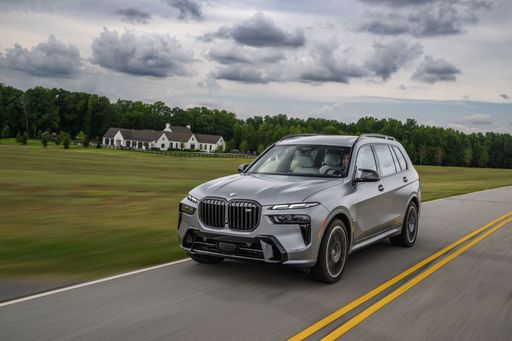 @ press.bmwgroup.com
@ press.bmwgroup.com
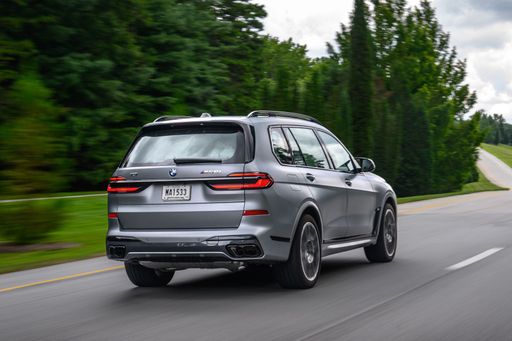 @ press.bmwgroup.com
@ press.bmwgroup.com
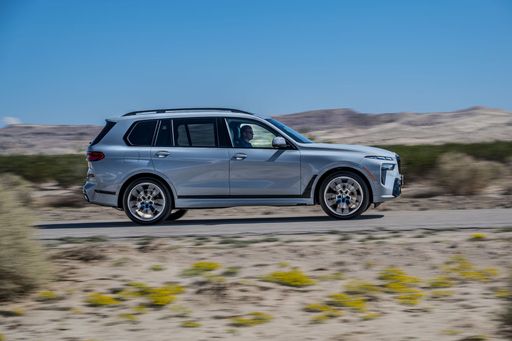 @ press.bmwgroup.com
@ press.bmwgroup.com
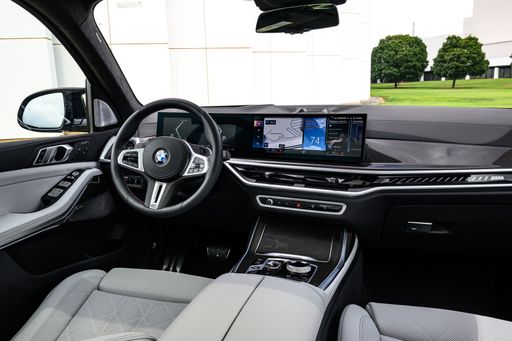 @ press.bmwgroup.com
@ press.bmwgroup.com
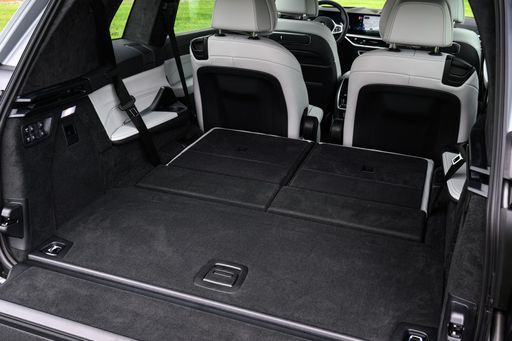 @ press.bmwgroup.com
@ press.bmwgroup.com
Ford Puma
The Ford Puma presents itself as a stylish compact SUV with a distinctive design that combines practicality with a dynamic driving experience. Its sleek lines and sporty aesthetics make it stand out on the road, while the interior offers a comfortable and tech-savvy environment. With an emphasis on efficiency and a smooth drive, the Ford Puma is well-suited for both urban commutes and countryside adventures.
details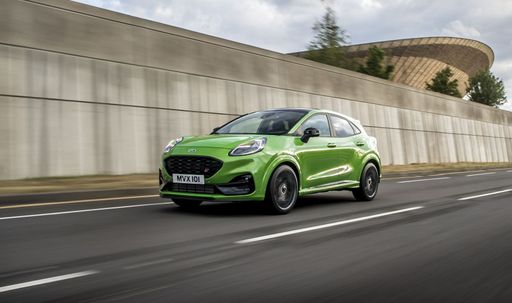 @ puma.fordpresskits.com
@ puma.fordpresskits.com
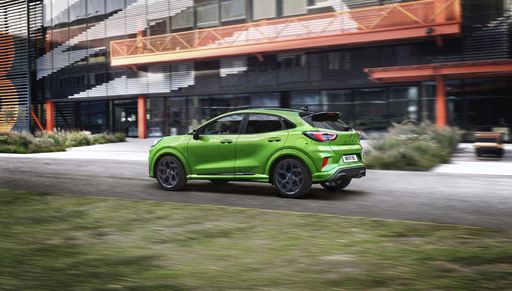 @ puma.fordpresskits.com
@ puma.fordpresskits.com
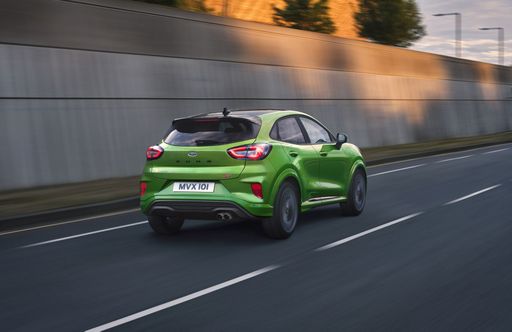 @ puma.fordpresskits.com
@ puma.fordpresskits.com
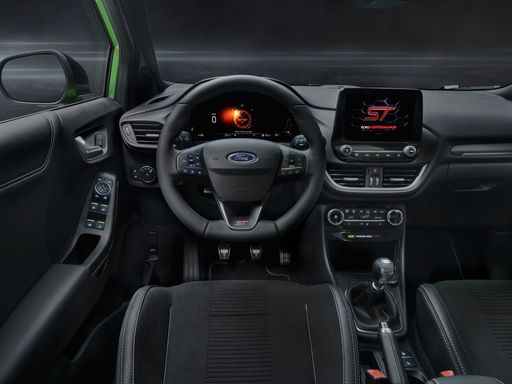 @ puma.fordpresskits.com
@ puma.fordpresskits.com

|

|
|
|
|
Costs and Consumption |
|
|---|---|
|
Price
90100 - 116800 £
|
Price
24800 - 34800 £
|
|
Consumption L/100km
7.9 - 12.1 L
|
Consumption L/100km
5.4 - 6 L
|
|
Consumption kWh/100km
-
|
Consumption kWh/100km
13.1 - 13.7 kWh
|
|
Electric Range
-
|
Electric Range
364 - 376 km
|
|
Battery Capacity
-
|
Battery Capacity
43 kWh
|
|
co2
206 - 273 g/km
|
co2
0 - 136 g/km
|
|
Fuel tank capacity
80 - 83 L
|
Fuel tank capacity
42 L
|
Dimensions and Body |
|
|---|---|
|
Body Type
SUV
|
Body Type
SUV
|
|
Seats
7
|
Seats
5
|
|
Doors
5
|
Doors
5
|
|
Curb weight
2490 - 2675 kg
|
Curb weight
1316 - 1563 kg
|
|
Trunk capacity
750 L
|
Trunk capacity
456 - 523 L
|
|
Length
5181 mm
|
Length
4186 - 4226 mm
|
|
Width
2000 mm
|
Width
1805 mm
|
|
Height
1835 mm
|
Height
1550 - 1555 mm
|
|
Payload
680 - 760 kg
|
Payload
367 - 469 kg
|
Engine and Performance |
|
|---|---|
|
Engine Type
Diesel MHEV, Petrol MHEV, Petrol
|
Engine Type
Petrol MHEV, Electric
|
|
Transmission
Automatic
|
Transmission
Manuel, Automatic
|
|
Transmission Detail
Automatic Gearbox
|
Transmission Detail
Manual Gearbox, Dual-Clutch Automatic, Reduction Gearbox
|
|
Drive Type
All-Wheel Drive
|
Drive Type
Front-Wheel Drive
|
|
Power HP
352 - 530 HP
|
Power HP
125 - 168 HP
|
|
Acceleration 0-100km/h
4.7 - 5.9 s
|
Acceleration 0-100km/h
7.4 - 9.8 s
|
|
Max Speed
245 - 250 km/h
|
Max Speed
160 - 210 km/h
|
|
Torque
520 - 750 Nm
|
Torque
170 - 290 Nm
|
|
Number of Cylinders
6 - 8
|
Number of Cylinders
3
|
|
Power kW
259 - 390 kW
|
Power kW
92 - 124 kW
|
|
Engine capacity
2993 - 4395 cm3
|
Engine capacity
999 cm3
|
General |
|
|---|---|
|
Model Year
2023
|
Model Year
2024 - 2025
|
|
CO2 Efficiency Class
G
|
CO2 Efficiency Class
D, E, A
|
|
Brand
BMW
|
Brand
Ford
|
BMW X7
Introduction to the BMW X7: A Luxurious Powerhouse
The BMW X7 stands as a testament to BMW's dedication to luxury, performance, and state-of-the-art technology. As BMW's flagship SUV, the X7 effortlessly combines opulent features with innovative engineering, ensuring a driving experience that is both exhilarating and refined.
Engine and Performance: A Blend of Power and Efficiency
Under the bonnet, the BMW X7 offers a variety of powertrains to suit different driving preferences. From the robust diesel mild-hybrid to the powerful petrol engine options, each boasts BMW's hallmark of efficiency without compromising on performance. With horsepower ranging from 352 to a staggering 530 PS, and acceleration from 0-100 km/h in just 4.7 seconds, the X7 delivers a thrilling yet smooth ride.
The advanced all-wheel-drive system ensures confidence-inspiring handling, while the state-of-the-art automatic transmission provides seamless gear changes, enhancing both city and highway driving experiences.
Design and Dimensions: Majestic and Commanding
The X7 makes a commanding statement with its expansive dimensions. Measuring 5181 mm in length and 2000 mm in width, BMW has designed this SUV not only to impress but also to offer unparalleled space within. The interior accommodates seven seats, providing generous comfort for every passenger. Coupled with a striking exterior design, the X7 is a blend of elegance and strength.
Technological Innovations: Ahead of Its Time
BMW's commitment to innovation is evident in every aspect of the X7. The SUV is equipped with cutting-edge features such as the M Sportpaket Pro Steptronic Sport, ensuring an engaging driving experience. The integration of state-of-the-art safety and driver-assistance systems further enhances on-road safety, making each journey as secure as it is enjoyable.
Inside, the high-quality infotainment system ensures passengers are connected and entertained, thanks to the intuitive control interfaces and connectivity options. Whether navigating city streets or cruising long distances, the X7's technology facilitates a seamless experience.
Environmental Considerations and Efficiency
Despite its powerful performance, the BMW X7 remains conscious of its environmental impact. Equipped with mild-hybrid technology, it achieves a balanced fuel consumption, with efficiency ratings between 7.9 and 12.1 L/100km. This demonstrates BMW's commitment to reducing emissions while providing a dynamic driving experience.
Conclusion: A Testament to Excellence
In conclusion, the BMW X7 is more than just an SUV; it is a symbol of luxury, performance, and technological advancement. Whether for the daily commute or cross-country adventures, the X7 stands prepared to exceed expectations, offering a driving experience marked by elegance and engineering prowess. For those seeking a vehicle that encapsulates the best of BMW, the X7 is an aspirational choice that delivers on all fronts.
Ford Puma
A Glimpse into the Ford Puma: Fusing Style with Innovation
The Ford Puma stands as a testament to modern engineering fused with style. This compact SUV is not just about aesthetics but brings to the table an array of technical innovations, topped with the reliability and performance Ford is known for. Let's delve into the technical specifics and innovative features that make the Ford Puma a stellar choice for any car enthusiast.
Powertrains and Performance
The Ford Puma is offered with a range of powertrains designed to deliver optimal performance whilst minimising fuel consumption. At the heart of this compact SUV is the 1.0 EcoBoost Hybrid engine, available in both 125 PS and 155 PS variants. This engine is a marvel of engineering, optimised to deliver power efficiently with a remarkable fuel consumption ranging from 5.4 to 5.7 L/100km for manual versions, and slightly higher for the automated variants.
The top-end 1.5 EcoBoost ST variant takes performance up a notch, providing a robust 200 PS that propels the Puma from 0 to 100 km/h in just 6.7 seconds. This variant is perfect for those who prioritise performance and exhilaration in their driving experience.
Mild-Hybrid Technology
The Puma's mild-hybrid technology plays a significant role in enhancing fuel efficiency and reducing emissions. By utilising a belt-driven integrated starter/generator, the Puma recovers energy usually lost during braking, storing it in a 48-volt lithium-ion battery. This stored energy is then used to assist the engine, providing a boost during acceleration and smoothing out the stop-start technology, ultimately leading to enhanced fuel efficiency.
Design and Comfort
The Ford Puma does not compromise on style and comfort with its ergonomic and stylish design. The SUV is available in multiple trims including the ST-Line, Titanium, and the luxurious Vignale editions, each offering unique aesthetic and technological enhancements. These trim levels provide varied offerings in terms of both exterior styling and interior comfort, ensuring there's a Puma that meets every personal preference.
Inside, the Puma offers a driver-focused cockpit with advanced technological integrations such as the SYNC 3 infotainment system, providing seamless connectivity and intuitive control of the vehicle's numerous technological features.
Safety and Technology
Safety remains paramount, and the Ford Puma is equipped with the latest security and technology features. It boasts the Ford Co-Pilot360 suite which includes adaptive cruise control, pre-collision assist with autonomous emergency braking, and lane-keeping assist, enabling a safer driving experience on both city roads and highways.
Versatility and Practicality
Beyond performance and safety, the Ford Puma shines in its versatility. With a boot capacity of 456 litres, it offers ample space for all sorts of adventures, whether you're heading on a family trip or loading sports equipment. Its innovative MegaBox is an extra storage solution, providing additional space below the boot floor.
The Puma's agile handling, paired with its compact dimensions—spanning a length of 4186 to 4266 mm and a width of 1805 mm—makes it an ideal choice for urban commuting and beyond.
Conclusion
In conclusion, the Ford Puma beautifully blends practical features with cutting-edge technology, offering a package that appeals to both the tech-savvy driver and those seeking comfort and reliability. Its range of innovative features, powerful yet efficient engine options, and a design that is both functional and stylish make it a frontrunner in the compact SUV market.
Whether you're drawn by the efficient mild-hybrid engines or the robust performance of the ST variant, the Ford Puma represents a modern driving experience where innovation meets everyday usability.
The prices and data displayed are estimates based on German list prices and may vary by country. This information is not legally binding.
